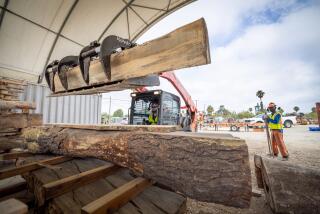Saws Fall Silent as Fort Bragg Faces Loss of Its Lumber Mill
- Share via
FORT BRAGG, Calif. — Sprawling between Main Street and wind-raked ocean bluffs, the Georgia-Pacific lumber mill has been far more than this town’s economic center. For generations, it has been part of the culture, the swagger, the identity of blue-collar Fort Bragg.
Before it started bleeding workers, the mill turned redwood trunks into stacks of lumber so dependably that kids could graduate high school on Friday and begin work on Monday, earning better pay than any job around.
Now it’s closing. The timber industry blames government meddling and environmental lawsuits. Environmentalists blame poor timber management and market forces.
A long, solitary whistle sounded as the last log went to mill. The piercing shift-change whistles used to be so clockwork, people all over town used them to tell time. Now fewer than 100 workers remain, most just a few years from retirement, to close down the mill.
“I call us the dinosaurs,” said Michael Floyd, a mill worker since graduating Fort Bragg High School, class of ’62. “We’re going to be extinct.”
Founded by lumber baron Charles Russell Johnson in 1885, the mill once employed 2,000. Old-timers said that if men in Fort Bragg didn’t have a job, there was something wrong with them.
Georgia-Pacific Corp. took over in 1972. The mill has had one profitable year since 1994, according to company officials, who blame tightened regulations, a dwindling supply of large trees, depressed prices and the emergence of synthetic alternatives to redwood.
“There was absolutely nothing we could do about it,” said Ron Holden, plant manager for five years.
Time was, a mill seemed to straddle every river drainage on California’s North Coast. Now, just 10 mills statewide process redwood, according to the industry-sponsored California Forestry Assn. Five closed in the last year.
Although the numbers have fluctuated, mill jobs fell from 22,000 statewide in 1988 to 13,400 in 2001, according to state employment data.
Georgia-Pacific is offering severance packages and training sessions with the county employment agency. But ripple effects are already evident in the town of 7,028, and worse trouble is coming.
The loss of 125 good jobs -- a $6-million payroll -- will take about $32 million out of the fragile local economy, by the calculations of Fort Bragg banker Tom Becker.
Georgia-Pacific has been the town’s anchor -- high schoolers play for the Fort Bragg Timberwolves in a stadium renovated by Georgia-Pacific; picnic tables at the local airport appear “courtesy of Georgia-Pacific.”
Now garages won’t service as many trucks, the grocery store will sell less food. The county, city and schools will lose about $380,000 in tax revenue. Fewer patients with health insurance will support the hospital. Bankers will have to defer loan payments from mill workers on the ropes.
Logger Mike Anderson, whose firm harvests timber for mills along the North Coast, will lose an indispensable customer. “Their checks never bounced,” he said. “They were always on time.”
As the town looks for a substitute industry, tourism seems the go-to option. Downtown, the refurbished Union Lumber Company Store houses boutiques and eateries. The best-known attraction is the Skunk Train, a ride into the redwood hills behind town.
Thus far, there are few shuttered shop fronts, and locals say hotel occupancy is up as tourists search for beds more affordable than the bed-and-breakfasts in cliff-side towns nearby.
But while the shift to tourism may keep up local tax revenue, it’s a raw deal for workers -- it takes about three times as many hours for a busboy’s salary to equal what a mill worker took home. Meanwhile, wealthy retirees and transplants from places such as San Francisco, about a four-hour drive south, drive up the cost of living.
“That’s really the sad thing,” said Robert Pinoli, Chamber of Commerce president. “People who grew up in this area can’t afford to stay.”
Above the stack jutting from the mill’s wood-fired power plant, perhaps the most obvious town landmark, a plume of steam still mingles with the fog that wisps over Main Street.
By mid-September, the stack will stop spewing and, by November, the mill will be dark. Already, the vast yards where lumber was stacked appear barren.
There’s no lack of ideas with what should occupy the mill’s 460 oceanfront acres: golf course, botanical garden, university, mall, desalination plant, abalone farm.
Whatever the decision, there’s work to be done before Georgia-Pacific sells a property worth hundreds of millions of dollars. Dismantling the last structures and cleaning the site may take years.
Outsiders suggest that Georgia-Pacific had planned to sell the mill as early as 1999, when it sold off 194,000 acres of timberlands. Company officials deny any such plan.
More recently, Georgia-Pacific decided to split the nation’s second-largest forest products company into distinct halves: a building materials supply company, and a consumer and commercial paper and plastics giant. The firm’s sales more than doubled during the 1990s and hit $25.1 billion in 2001, but over the past year, the stock price has fallen by nearly half.
Mill worker Kenny Alfaro, 59, calls it plain mismanagement. “You can show me all the books you want, but I know better,” he said, pointing out that the last North Coast redwood mills are profitable.
Georgia-Pacific officials insist that the inevitable has arrived. “I don’t know what those other companies’ stories are,” spokesman Greg Guest said. “But our story is that we have been unable to be profitable there.”
More to Read
Inside the business of entertainment
The Wide Shot brings you news, analysis and insights on everything from streaming wars to production — and what it all means for the future.
You may occasionally receive promotional content from the Los Angeles Times.










